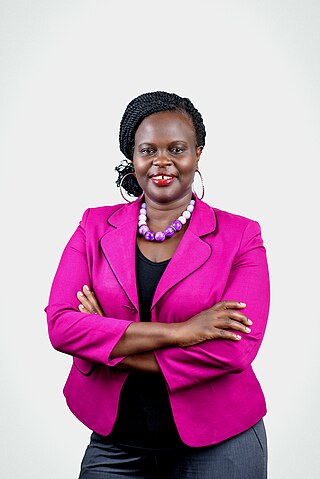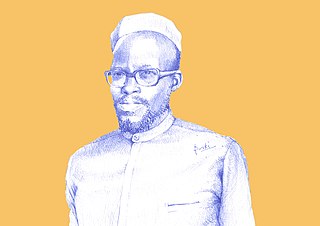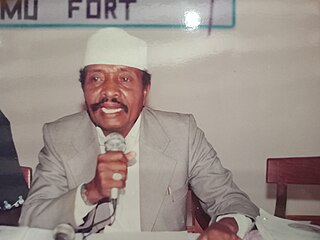Related Research Articles
Timothy Wangusa is a Ugandan poet and novelist. Wangusa was chairman of Uganda Writers Association and founder president of International PEN Uganda Centre.
Elvania Namukwaya Zirimu was a Ugandan poet and dramatist. She formed the Ngoma Players, with the policy of writing and producing Ugandan plays, and was actively concerned with the National Theatre. She belonged to the early generation of English-language Ugandan writers and playwrights that includes novelist Okello Oculi, playwright John Ruganda, and novelist Austin Bukenya. Her best-known work is the one-act play Keeping up with the Mukasas, included in David Cook's 1965 anthology of East African plays, Origin East Africa.

Monica Arac de Nyeko is a Ugandan writer of short fiction, poetry, and essays, living in Nairobi, Kenya. In 2007, she became the first Ugandan to win the Caine Prize for African Writing, with her story "Jambula Tree". She had previously been shortlisted for the prize in 2004 for "Strange Fruit", a story about child soldiers in Gulu, Northern Uganda. She is a member of FEMRITE – Uganda Women Writers Association and the chief editor of T:AP Voices. She taught literature and English at St. Mary's College Kisubi, before proceeding to pursue a Master's degree in Humanitarian Assistance at the University of Groningen. Her personal essay "In the Stars" won first prize in the Women's World, Women in War Zones essay writing competition. She has been published in Memories of Sun, The Nation, IS magazine, Poetry International and several other publications. She was one of the writers chosen as part of the Africa39 project unveiled by Rainbow, Hay Festival and Bloomsbury Publishing at the London Book Fair 2014, featuring a list of 39 of Sub-Saharan Africa's most promising writers under the age of 40.
Mildred Kiconco Barya is a writer and poet from Uganda. She was awarded the 2008 Pan African Literary Forum Prize for Africana Fiction, and earlier gained recognition for her poetry, particularly her first two collections, Men Love Chocolates But They Don't Say (2002) and The Price of Memory: After the Tsunami (2006).
John Ruganda was Uganda's best known playwright. Beyond his work as a playwright, Ruganda was also a professor at University of North, South Africa, University of Nairobi, and Makerere University.
Ayeta Anne Wangusa is a Ugandan writer and activist. A founding member (1995) of FEMRITE, the Uganda Women Writers Association, Wangusa first achieved broader recognition in literary circles for her novel Memoirs of a Mother (1998). She was also a founding member (2009) of the African Writers Trust, currently serving on the advisory board. She is a contributor to the 2019 anthology New Daughters of Africa, edited by Margaret Busby.

FEMRITE – Uganda Women Writers' Association, founded in 1995, is an NGO based in Kampala, Uganda, whose programmes focus on developing and publishing women writers in Uganda and—more recently—in the East African region. FEMRITE has likewise expanded its concerns to East African issues regarding the environment, literacy, education, health, women's rights and good governance.
Susan Nalugwa Kiguli is a Ugandan poet and literary scholar. She is an associate professor of literature at Makerere University. Kiguli has been an advocate for creative writing in Africa, including service as a founding member of FEMRITE, a judge for the Commonwealth Writers' Prize, and an advisory board member for the African Writers Trust. As a poet, Kiguli is best known for her 1998 collection The African Saga, as a scholar, and for her work on oral poetry and performance.

Wanjiku Kabira is an associate professor of literature at the University of Nairobi, Kenya. She has specialized in the fields of Oral literature, African-American literature and Caribbean literature. She has been actively involved in women affairs and in gender issues. Wanjiku has served as in various capacities notably as a. Vice-Chair in the Kenya Constitutional Review Process (2000–2005) b. Chair Person Women Political Alliance (2002–2011) c. Director Collaborative Center for Gender and Development (1995–2009) d. Chair, Department of Literature, University of Nairobi

Beverley Nambozo Nsengiyunva is a Ugandan writer, poet, actress, literary activist, and biographer. She is the founder of the Babishai Niwe (BN) Poetry Foundation formerly The Beverley Nambozo Poetry Award for Ugandan women, which began in 2008 as a platform for promoting poetry. It has since grown to include all African poets and runs as an annual poetry award. In 2014, the award will extend to the entire continent, targeting both men and women. The same year, the foundation will also publish an anthology of poetry from poets of Africa. She is also the founder of the Babishai Niwe Women's Leadership Academy. Nambozo joined the Crossing Borders Scheme British Council Uganda in 2003 under the short stories genre. She was nominated for the August 2009 Arts Press Association (APA) Awards for revitalising poetry in Uganda after initiating the Beverley Nambozo Poetry Award, the first poetry award for Ugandan women.

Hilda Twongyeirwe is a Ugandan writer and editor. For ten years, she taught English language and literature in secondary school, before she retired to do development work in 2003. She is an editor, a published author of short stories and poetry, and a recipient of a National Medal of the government of Uganda in recognition of her contribution to women's Empowerment through Literary arts (2018). She is also a recipient of a Certificate of Recognition (2008) from the National Book Trust of Uganda for her children's book, Fina the Dancer. She is currently the coordinator of FEMRITE, an organization she participated in founding in 1995. She has edited fiction and creative nonfiction works, the most recent one being, No Time to Mourn (2020) by South Sudanese women. She has also edited others including; I Dare to Say: African Women Share Their Stories of Hope and Survival (2012) and Taboo? Voices of Women on Female Genital Mutilation (2013).
Beatrice Lamwaka is a Ugandan writer. She was shortlisted for the 2011 Caine Prize for her story "Butterfly Dreams".
Lillian Tindyebwa is a Ugandan writer living in Kampala. She is the author of numerous books, notably the novel Recipe for Disaster, published in 1994 as part of the Fountain youth series. She is a founding member of FEMRITE, and the founder of Uganda Faith Writers Association.

Pio Zirimu was a Ugandan linguist, scholar and literary theorist. He is credited with coining the word "orature" as an alternative to the self-contradictory term, "oral literature" used to refer to the non-written expressive African traditions. Zirimu was also central in reforming the literature syllabus at Makerere University to focus on African literature and culture instead of the English canon.
Iga Zinunula is a Ugandan poet and Veterinary Assistant. He has engaged in rural development work all over Uganda since 1990. He is a member of the editorial board of FEMRITE. He has been a judge at the Babishai Niwe (BN) Poetry Foundation.
Nakisanze Segawa is a Ugandan poet and storyteller. She is the author of the 2016 novel The Triangle. She took third place in the 2010 Beverley Nambozo Poetry Award for her poem "The hustler". She was a participant in the Ebedi International Residency in Iseyin, Nigeria, in January 2015.
Rebecca Nandwa is a Kenyan writer who is best known for her children's books written in Swahili. She has been involved in a wide range of journalism and editorial work and used to be a teacher.

Thomas Tayebwa is a member of the Parliament of Uganda since 2016, and has served as Deputy Speaker of the Parliament since 2022. He was appointed as the Government Chief Whip by Yoweri Kaguta Museveni. Since 2016, he serves as the Member of Parliament for Ruhinda North County in Mitooma District and a member of NRM. He became known for beating a UMEME employee on a leaked video, for which he apologized on 29 August 2020. He served as a member of National Economy Committee and Natural Resources Committee. On 25 March 2022, he was elected by fellow MPs as the Deputy Speaker of Uganda's 11th Parliament, taking over from Among who moved up to be the Speaker of the Parliament, all events following the death of Speaker Jacob Oulanyah.
Achola Pala is a Kenyan anthropologist, sociologist, and women's policy specialist. Born in a small town in western Kenya, Pala completed her education at the University of East Africa and Harvard. She worked as a researcher with the University of Nairobi and later was the head of social science research at the International Centre of Insect Physiology and Ecology. Concerned about women's empowerment and the impact of public policies on women, she worked with numerous divisions of the United Nations including UNESCO, UNICEF, the United Nations University, and the World Food Council, before becoming chief of the Africa Section of UNIFEM. She also participated in numerous conferences on women including the 1980, 1985, and 1995 World Conferences on Women. She worked with Esther Jonathan Wandeka to gain governmental support for the 1985 conference held in Nairobi and was instrumental in introducing the peace torch at the 1995 Beijing conference.

Ahmed Sheikh Nabhany was a Kenyan academic scholar, poet, lexicologist, historian and professor often regarded as the father of modern Swahili poetry. He was the recipient of The Order of the Grand Warrior (O.G.W).
References
- ↑ Prof. challenges gov’t on role of humanities newvision.co.ug. Retrieved 7 May 2014.
- ↑ "The People’s Bachelor – the greatest Ugandan novel" Archived 8 May 2014 at the Wayback Machine , edirisa.org. Retrieved 8 May 2014.
- 1 2 The Bride… a review Words on Austin Lwanga Bukenya’s The Bride, joankivanda.wordpress.com. Retrieved 7 May 2014.
- 1 2 3 Austin Bukenya Archived 20 May 2014 at the Wayback Machine , badilishapoetry.com. Retrieved 7 May 2014.
- 1 2 3 The Future for Young Writers is Online – Bukenya redpepper.co.ug. Retrieved 7 May 2014.
- ↑ Student Alumini Archived 26 May 2014 at the Wayback Machine namilyangocollege.sc.ug. Retrieved 7 May 2014.
- ↑ FEMRITE Membership, femriteug.org. Retrieved 7 May 2014.